Coordinación
Una coordinación sólida puede evitar vacíos y duplicaciones en las respuestas humanitarias, así como garantizar que los PTM complementen otros tipos de asistencia. Sin embargo, el informe del «Estado Global de los Programas de Transferencias Monetarias» de la CALP Network muestra que la coordinación de la asistencia en efectivo es vista como débil y ad hoc, y que esto está teniendo graves repercusiones operativas.
Los donantes, las ONG y los líderes de los grupos de trabajo de transferencias monetarias (GTM) han pedido claridad sobre tres temas principales relacionados con la coordinación de la asistencia en efectivo:
- Quién debe ser responsable de asegurar una coordinación eficaz de la asistencia en efectivo;
- Cuál es la función y el mandato de los grupos de trabajo de transferencias monetarias, incluso en relación con las transferencias monetarias multipropósito;
- Cómo se debe dotar de recursos a la coordinación de asistencia en efectivo.
Tenemos que basarnos urgentemente en lo que funciona y proporcionar claridad a nivel mundial sobre las preguntas arriba mencionadas, adaptándonos a los diferentes contextos. Hace mucho tiempo que se deberían haber tomado decisiones claras basadas en necesidades operativas y no en la política de las agencias.
Prioridades actuales
El objetivo de la CALP Network es contribuir a seguir progresando en este tema en tres niveles: apoyar a los grupos de trabajo de transferencias monetarias a nivel regional; contribuir a soluciones prácticas para la coordinación de la asistencia en efectivo a nivel mundial; y convocar una discusión basada en la evidencia sobre temas clave, destacando puntos de decisión críticos y oportunidades de progreso.
Contenido destacado

Cash Coordination Tip Sheet
Guidelines and Tools
This tip sheet sets out established best practice, key guidance and resources for all aspects of cash coordination, intended as a clear, accessible and action-oriented guide for those engaged in coordination of cash and voucher assistance (CVA) at the field level.

Introducing the Cash Coordination Tip Sheet
Webinar
The CALP Network has developed a tipsheet setting out established best practice and key guidance and resources for all aspects of cash coordination, intended as a clear, accessible and action-oriented guide for those engaged in coordination of cash and voucher assistance at the field level.

Cash Coordination: A proposal from members in MENA
Blog Post
Earlier this year the CALP Network undertook regional consultations to explore options for cash coordination. This blog lays out recommendations from participants from the Middle East and North Africa who sketched out what cash coordination, and coordination more broadly, could look like in future to support a more effective, efficient and accountable response.
Últimos recursos
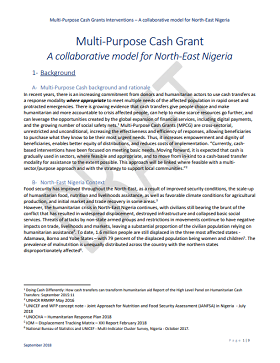
Multi-Purpose Cash Grant – A collaborative model for North-East Nigeria
Report
In recent years, there is an increasing commitment from donors and humanitarian actors to use cash transfers as a response modality where appropriate to meet multiple needs of the affected population in rapid onset and protracted emergencies. There is growing evidence that cash transfers give people...
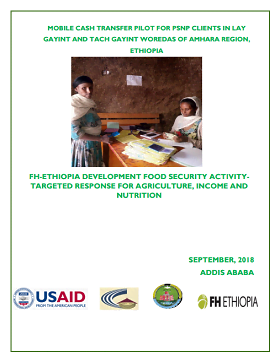
Mobile Cash Transfer for Pilot for PSNP clients, in Ethiopia
Report
The study aimed to understand mobile cash transfer effectiveness and satisfaction level of PSNP clients during the three rounds (January to March) e-payment in 2018 in Amhara Region, Ethiopia, East Africa.
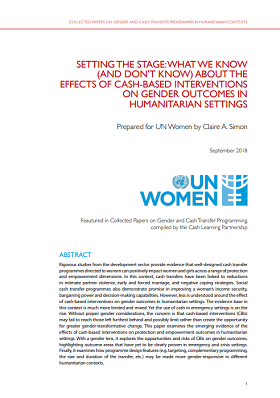
Setting the Stage: What we know (and don’t know) about the effects of cash-based interventions on gender outcomes in humanitarian settings
Report
From ‘Collected Papers on Gender and Cash Transfer Programmes in Humanitarian Contexts’. Existing gender inequalities mean that disasters and conflicts impact women, men, girls and boys differently. Cash based assistance is one of the most significant developments in humanitarian assistance in recent...

Need and greed: corruption risks, perceptions and prevention in humanitarian assistance
Report
Emergency environments present unique corruption risks for agencies operating within them. Relief is delivered amidst weak or absent rule of law, endemic corruption and immense need. The capacities of governments and humanitarian agencies to assist affected people are stretched to the limit, and agencies...
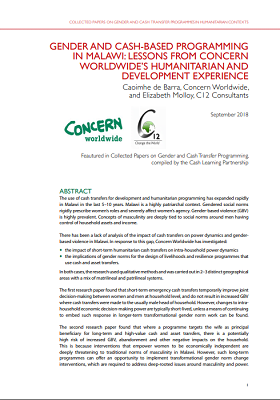
Gender and Cash-Based Programming in Malawi: Lessons from Concern Worldwide’s humanitarian and development experience
Report
From ‘Collected Papers on Gender and Cash Transfer Programmes in Humanitarian Contexts’. Existing gender inequalities mean that disasters and conflicts impact women, men, girls and boys differently. Cash based assistance is one of the most significant developments in humanitarian assistance in recent...
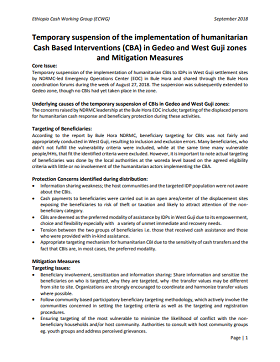
Temporary suspension of the implementation of humanitarian Cash Based Interventions (CBA) in Gedeo and West Guji zones and Mitigation Measures
Report
Temporary suspension of the implementation of humanitarian CBIs to IDPs in West Guji settlement sites by NDRMC-led Emergency Operations Center (EOC) in Bule Hora and shared through the Bule Hora coordination forums during the week of August 27, 2018. The suspension was subsequently extended to Gedeo zone,...

How Cash and Food Transfers and Asset Creation Can Contribute to Women’s Empowerment: Learning from Niger, Kenya and Zimbabwe
Report
From ‘Collected Papers on Gender and Cash Transfer Programmes in Humanitarian Contexts’. Existing gender inequalities mean that disasters and conflicts impact women, men, girls and boys differently. Cash based assistance is one of the most significant developments in humanitarian assistance in recent...
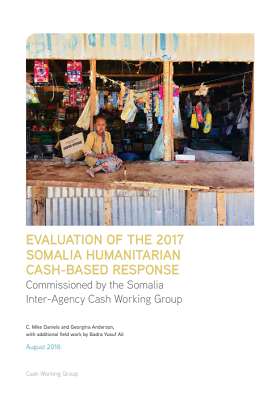
Evaluation of the 2017 Somalia Humanitarian Cash-Based Response
Report
After several years of poor rainfall, the humanitarian community responded to a famine alert issued in January 2017 with a significant scale-up of funding and programmes. Having originally published a 2017 Humanitarian Response Plan (HRP) in November 2016, by May 2017, the Somalia Humanitarian Country...
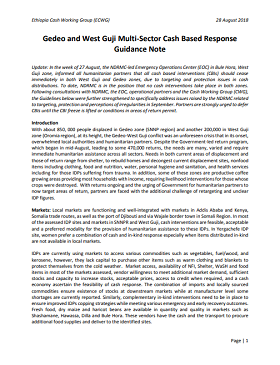
Gedeo and West Guji Multi-Sector Cash Based Response Guidance Note
Guidelines and Tools
With about 850, 000 people displaced in Gedeo zone (SNNP region) and another 200,000 in West Guji zone (Oromia region), at its height, the Gedeo-West Guji conflict was an unforeseen crisis that in its onset, overwhelmed local authorities and humanitarian partners. Despite the Government-led return...

Protocolo Nacional de Actuación Para la Protección Social Frente a Choques Climáticos
Informe
Este protocolo para protección social frente a choques climáticos es una herramienta de planificación y establecimiento de procedimientos para las actuaciones del Gabinete de Coordinación de Políticas Sociales (GCPS), incluyendo las actuaciones especiales del Programa Progresando con Solidaridad...

Three Takeaways from the ECOSOC-HAS Discussion on Linking Cash Transfers with Social Protection Systems
Blog Post
There is growing interest from governments and donors alike in building or strengthening social protection systems to protect the poorest and most vulnerable people. The CALP Network's Lynn Yoshikawa joined a panel with representatives from governments, UN agencies, NGOs and donors to discuss the...

New Markets Support Tip Sheet and Webinar
Blog Post
Have you heard about market support programming but don’t quite understand what it is or how to put it into practice? The CALP Network has developed a tip sheet with Catholic Relief Services (CRS) and our Markets Working Group, and will share tips and tricks from the community of practice in a launch...

ASPIRES Family Care Process Assessment: Savings Groups for Family-Child Reintegration and Prevention of Separation
Report
The ASPIRES project aims to advance household economic strengthening (ES) programs for vulnerable populations. ASPIRES offers technical assistance to scale up high-quality interventions in the areas of consumption support, money management, and income promotion. The project also supports rigorous research...
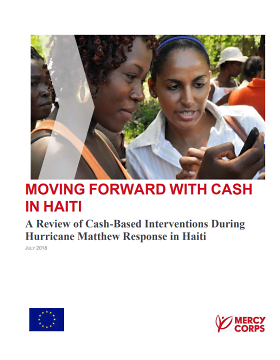
Moving Forward with Cash in Haiti: A Review of Cash-Based Interventions during Hurricane Matthew Response in Haiti
Case Study
Mercy Corps, with funding from European Civil Protection and Humanitarian Aid Operations (ECHO) has conducted an extensive review of lessons learned and contextual data, combined with key informant interviews and workshops to compile, analyse and present core lessons from the Hurricane Matthew cash-based...
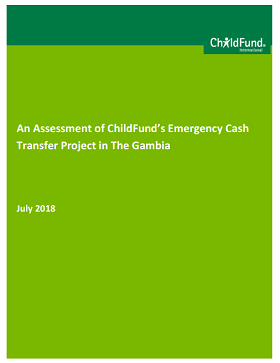
An Assessment of ChildFund’s Emergency Cash Transfer Project in The Gambia
Report
Review of ChildFund’s pilot cash transfer intervention using mobile money, assisting people displaced by political crisis. Includes description of project design, results, assessment, and recommendations for future cash-based interventions. Project participants appreciated the cash which they used to...

The Grand Bargain Cash Meetings: what did we learn, how are we doing, where next?
Blog Post
After cash focal points from Grand Bargain signatory organisations gathered in Rome for the second annual meeting of the Grand Bargain cash workstream, we ask how much progress has been made towards commitments, and what remains to be done.
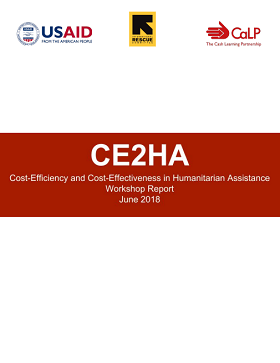
Cost Efficiency and Cost Effectiveness in Humanitarian Assistance Workshop Report
Report
A report of the Cost Efficiency and Cost Effectiveness workshop held on 9-10 April and organized by USAID, IRC and the CALP Network. The recommendations of the workshop was fed into the Grand Bargain cash workstream.
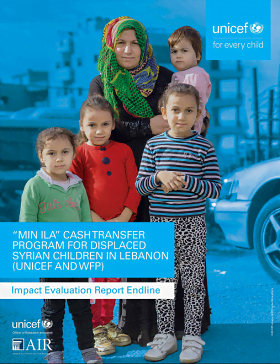
“Min Ila” cash transfer program for displaced Syrian children in Lebanon
Report
“Min Ila” is a cash transfer program that was implemented by UNICEF and the United Nation’s World Food Program (WFP) in coordination with the Ministry of Education and Higher Education (MEHE), between 2016 and 2018 covering two (and later three) Lebanese governorates. The program, also known as...

Micro-level changes in market recovery and growth: The Ebola CTP experience
Webinar recording
Following our Ebola dissemination event in Dakar, the CALP Network hosted a webinar looking at the micro level effects of cash transfers on local economies during the Ebola crisis. Listen to the recording here.
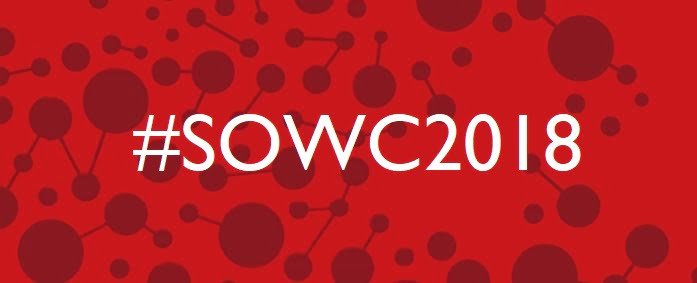
#SOWC2018 Launch Event and Webinar for the Asia Region, 16 May
Blog Post
The CALP Network will launch the State of the World’s Cash report in the Asia region through a dedicated event with the Regional Cash Working Group. More information and details of how to join here.